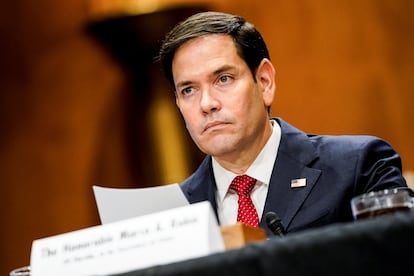Designation of cartels as terrorist organizations fuels tension between Mexico and the US ahead of Trump’s inauguration
Marco Rubio, the next Secretary of State, claims at Senate confirmation hearing that Mexican drug traffickers have operational control over large swaths of the border

The war on drugs has triggered the latest clash between Mexico and the United States with less than a week to go before Donald Trump returns to the White House. Marco Rubio, the next head of U.S. diplomacy, did not hold back at his appearance in the Senate on Wednesday for his confirmation hearing, where he said that organized crime dominates large portions of Mexican territory, despite the messages of containment sent by Mexican President Claudia Sheinbaum’s government.
“They basically have operational control over huge swaths of the border regions between Mexico and the United States,” said Trump’s choice for Secretary of State. Rubio spoke again and again of the “terror” caused by drug trafficking organizations and insisted on the plan to designate the cartels as terrorist groups, a particularly thorny point between both countries due to the possibility that it could serve as justification for the use of military force by Washington. “It is an option the president has at his disposal,” said the Cuban-born politician.
“It is important for us to not just go after these groups but identify them and call them what they are,” Rubio stressed. The next Secretary of State made it clear that the most urgent priority with Mexico is security, an issue that means essentially two things from Trump’s perspective: drug trafficking and the migration crisis. “[The cartels] are terrorizing America with mass migration and a flow of drugs,” he said.
Sheinbaum, meanwhile, has been adamant in her rejection of equating drug trafficking with terrorism, and has been especially cautious in order to avoid the possibility of unilateral action by Washington on Mexican territory which, despite being justified under U.S. laws, would be contrary to international law. In Mexico, the issue has divided opinion among experts, and the debate on narcoterrorism has entered fully into the political arena, with the opposition using the term after each spike in violence while the government entrenches itself in the other corner. The crisis of violence in Mexico has been worrying both U.S. Democrats and Republicans and has fueled doubts in Washington about the control that Mexican authorities really have over various areas of the country.
Despite the harshness of some of his comments, there were also several nuances in Rubio’s remarks. He noted that, although the use of force is a tool that the president has at his disposal, it is not the preferred option of the State Department. Regarding the designation of the cartels as terrorist groups, he admitted that it was an “imperfect tool” and suggested that the measure was not enough to fulfill the promise of ending criminal organizations.
Rubio also said that the scenario “in an ideal world” would be cooperation with the Mexican authorities, which opens the door to a new front of negotiations between both countries. “[The cartels] are terrorizing and undermining the Mexican government and Mexican sovereignty and the health and well-being of the Mexican people,” he said. “There is a lot we can and will continue to do with our allies in Mexico. There is more they can do to confront this challenge.”
The former senator for Florida had already acknowledged in an interview before the November elections that a military intervention against criminal groups was not viable without the endorsement of the Mexican Armed Forces, a fact that has not prevented him from criticizing the Mexican authorities for the porosity of the border and the lack of decisive action against organized crime.
Pam Bondi, Trump’s pick for attorney general, also joined the ranks of those in favor of designating the cartels as terrorist groups at her own confirmation hearing before the Senate. “They are a grave and violent threat to our country,” said the former California attorney general, who pledged to do everything in her power against criminal organizations. Despite the attention it has received in recent weeks, the idea of equating drug trafficking with terrorism has been around in Washington for at least a decade, even under Democratic administrations.
Faced with this attitude, Sheinbaum has adopted a proactive stance and has sent signals in recent months that she is sensitive to Trump’s concerns. Her government announced in early December the largest seizure of fentanyl in the country’s history, the equivalent of 20 million doses. She also moved Omar García Harfuch, the architect of her security policy, to Sinaloa, where a cartel war has been raging for four months that has left more than 650 murders in official records.
The president has publicly insisted that she is open to working with U.S. authorities, although she has also outlined her administration’s red lines against pressure from Washington. “Cooperation without subordination,” the president has insisted in recent weeks. “We will always hold our heads high. Mexico is a free, independent and sovereign country,” she said to her followers last Sunday, while giving a report on her first 100 days in office.
Sign up for our weekly newsletter to get more English-language news coverage from EL PAÍS USA Edition
Tu suscripción se está usando en otro dispositivo
¿Quieres añadir otro usuario a tu suscripción?
Si continúas leyendo en este dispositivo, no se podrá leer en el otro.
FlechaTu suscripción se está usando en otro dispositivo y solo puedes acceder a EL PAÍS desde un dispositivo a la vez.
Si quieres compartir tu cuenta, cambia tu suscripción a la modalidad Premium, así podrás añadir otro usuario. Cada uno accederá con su propia cuenta de email, lo que os permitirá personalizar vuestra experiencia en EL PAÍS.
¿Tienes una suscripción de empresa? Accede aquí para contratar más cuentas.
En el caso de no saber quién está usando tu cuenta, te recomendamos cambiar tu contraseña aquí.
Si decides continuar compartiendo tu cuenta, este mensaje se mostrará en tu dispositivo y en el de la otra persona que está usando tu cuenta de forma indefinida, afectando a tu experiencia de lectura. Puedes consultar aquí los términos y condiciones de la suscripción digital.









































